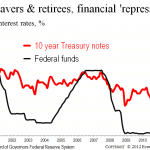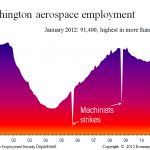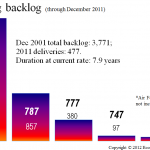The economic headlines are grim almost everywhere you look. An item on Page 1 of today’s Financial Times sums things up succinctly: Growth in the US is slowing, much of Europe is in recession, China’s growth outlook has weakened, the reform processes in India have stalled and other large emerging [continue reading . . . ]
My life-long love affair with newspapers and with newsprint dates from my childhood. My mother and I used to walk from my parents’ apartment in Brown’s Addition to downtown Spokane. Along Monroe Street, I could peer into the street-level press room of Spokane’s newspapers, the Spokesman-Review and Daily Chronicle. As [continue reading . . . ]
Uh, oh, indeed. The Financial Times reports in its May 31 edition that yields on two-year German bonds on May 30 fell to zero for the first time. As the Times put it, investors are willing to lend to Berlin for two years for no return. The yield on the [continue reading . . . ]
Uh, oh. That’s what I find myself muttering these days when I fire up the news browser or open my morning papers. The economic news leaves me with a sense of dread. I find three developments especially worrisome: 1. Europe’s slow-motion economic crisis, now more than three years old, rumbles [continue reading . . . ]
Are America’s best days in the rear-view mirror? The Economist‘s Lexington columnist reminds us (May 12, 2012, print edition) that bouts of what it labels “declinism” are, well, almost as American as apple pie. It wasn’t so long ago that Japan was buying up iconic U.S. real estate (New York [continue reading . . . ]
The trouble with the French is that they are sick and tired of austerity, and they won’t take it any more. Oh, and by the way, they want it all. Big government, check. The French public sector accounts for more than half of the economy. Early retirement, check. Voters threw [continue reading . . . ]

Prompted by reading, I’ve been thinking about an essay arguing that today’s exceptionally low interest rates are a form of default. The idea is far from original. Op-ed pieces in the Financial Times and the Wall Street Journal have seeded my thinking. An op-ed in today’s Wall Street Journal by [continue reading . . . ]

Aerospace-related manufacturing employment in Washington reached 92,300 in February. For two months running, the level has been higher than at any time in more than a decade; the last time we were in this neighborhood was November 1999, at 91,700. It is hard to overstate the importance of Boeing-related employment [continue reading . . . ]
“For Big Companies, Life is Good.” That was the headline on the Marketplace Section front page of the Wall Street Journal April 9. The item reported that sales, profits and employment of the largest American companies, the Standard and Poor’s 500, last year exceeded the highs reached before the Great [continue reading . . . ]
With 30 years of service, most employees of Washington state can retire with full defined-benefit pension benefits at age 62. Given today’s life expectancies and low investment returns, this places an enormous burden on taxpayers, most of whom don’t have the luxury of defined-benefit plans. Republicans in the Washington State [continue reading . . . ]

[Updated March 20; see below] Is Boeing’s bulging backlog a figurative block of Swiss cheese, full of holes? It isn’t if Boeing’s own figures are reliable. The excess of orders over deliveries at the end of February 2012 reached more than 4,000 (data and chart updated March 18). Simple math [continue reading . . . ]
The Tea Party? Not for me, thanks. But I am outraged as the next person by abuse of public trust. How about a $300,000 luxury party boat purchased by the good folks at NOAA. Or a Snohomish County executive who traveled widely with his mistress on the public dime (see [continue reading . . . ]